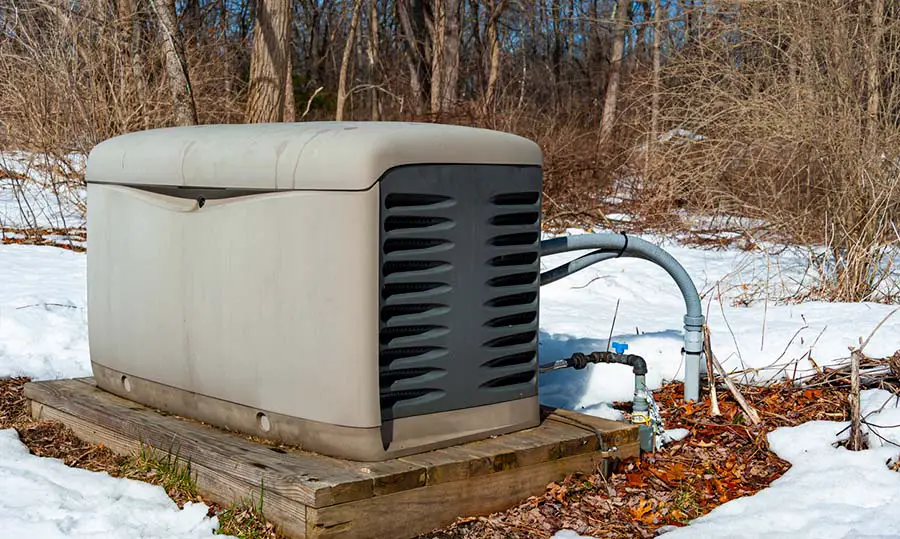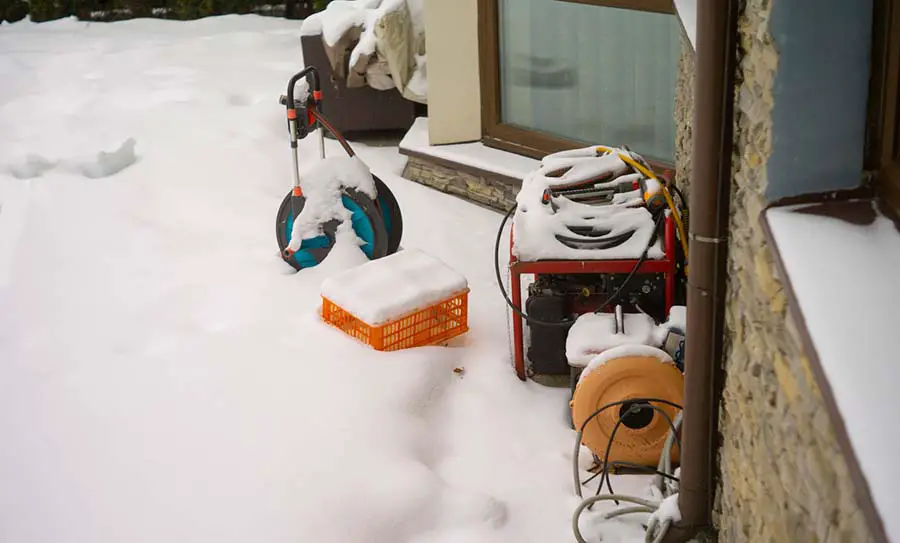
Generators are great for providing alternative power in the event of a blackout or supplementing your power requirements when camping or living off-grid. Most of us know that these machines are robust and can operate in conditions that we would not expect other engines to cope with. As a result, we seldom give our generators the care they should receive, including protection from water damage.
Generators are not waterproof. At most, a generator may be water-resistant, depending on its casing. If you expose your generator to excessive water or moisture, it can be harmful to you and the generator. Moisture can cause a generator to short circuit or electrocute you and fail to work correctly.
Generators, even small ones, can produce enough electricity to supply a lethal dose of electricity if the generator becomes wet or the cables plugged into the generator get wet and wick the moisture back to the generator.
You need to take steps to protect your generator from the elements for your well-being and your generator’s health.
Why Generators are Not Waterproof
Generators generally have engines that can run off a variety of different fuel sources. The generator uses its engine to generate electricity used to run appliances, provide lighting, or run power tools, depending on the generator’s size and power capabilities.
Generators are built to run outdoors in often rugged and harsh conditions, but this does not make them indestructible or immune to damage from the elements, especially water, snow, and ice.
The engines that run generators need access to clean air and clean, uncontaminated fuel so that the motor can run efficiently to produce the required electricity. Here are some reasons why generators are typically not fully waterproof:
- There needs to be airflow around the motor
- Necessary outlets and ports allow water inside
- Harsh conditions will damage and allow water in
By their very nature, engines become hot when they are running; this requires that the generator’s housing is such that it allows for sufficient airflow around the motor to keep it cool and prevent overheating.
Therefore, the housing around the generator’s motor can not be watertight, as this would require it to be airtight. Preventing air from circulating the motor will cause it to run too hot, which will cause damage to the engine and its components.
Many generators have cladding around the generator’s electronic components, but these panels are by no means waterproof. They may be water-resistant to a certain extent and protect the generator and the electronic components in a light drizzle. Sustained exposure to rain, even light rain, will cause water to penetrate the housing and damage the electronics or the motor.
What Damage Can Water Do To a Generator?
If your generator is simply left out in the rain or exposed to excessive snow, resultant water flow can cause irreparable damage to your generator. For most of us, our generators are there to help us out in an emergency, and for others, it is their primary source of power. As such, we cannot have these machines break down when we need them most!
Snow melting produces water, which can cause the same amount of damage as rain. As we advance, we’ll focus on general water damage for the sake of simplicity.
On most generators, the fuel tank that holds the fuel is on top of the unit and provides a certain measure of protection to the components beneath it. However, significant amounts of rain or moisture on top of the generator can cause water to penetrate the fuel tank and contaminate the fuel.
Contaminated fuel may prevent the generator from starting at all. If the contamination is less severe, the engine may start, but it will not run smoothly. It will often stutter, stumble, and may not have enough power to generate electricity.
Water running down from the top of the generator can enter the air filter and, via this route, enter the carburetor and cause the engine to stop firing. If the water contamination I severe, the spark plug electrodes can become wet and take some time to dry out sufficiently before they will spark again.
Severe water infiltration of the generator’s engine could even cause the motor to seize, rendering the motor irreparable.
Water can also penetrate the electronic components of the generator and short them out. This could burn out wires, blow fuses and blow circuit boards.
What are the Dangers of a Wet Generator?

Of course, the dangers of a generator getting wet is not only potentially damaging to the generator, but there are other potential consequences to this situation.
If the generator’s electrical outlets become wet, they could cause a short circuit, damaging any electrical appliance that the generator is powering.
This is especially true if you power electronically sensitive equipment such as computers, cameras, cellphones, radios, and other communications equipment with your generator.
The most significant and potentially hazardous result of a generator that gets wet is the likelihood of electric shock or electrocution. Electrocution can be a life-threatening event and not a risk that you should take lightly.
How To Protect Your Generator From Water Damage
Since generators are not waterproof and generally used outdoors, what measures can you take to protect them from the weather?
- Store your generators in a safe, dry place
- Cover your generator with a tarp while using it
- Keep your generator off the ground
- Build a structure to protect your generator if needed
- Elevate and droop cables so they dont carry water
If you do not use your generator daily, you should store it somewhere not exposed to the elements. The best place to store it would be in a dry garage, barn, or shed, where it will not be exposed to rain, flowing water, melting snow and ice, and excessive heat from direct sun exposure.
If you use your generator daily and it is not practical to pack it away somewhere safe, you need to take precautions to protect it from getting wet.
A simple solution as rigging up a tarp in an A-frame shape to protect your generator from the rain could be sufficient, particularly if you are only running the generator short term for a few days.
You should also elevate the generator off the ground a little by placing it on some appropriately sized pieces of wood or stand it on bricks. This will protect the generator from running groundwater, should it flow through the area where you have located your generator.
Suppose you are using your generator for a more extended period. In that case, you may want to build a structure for it that would provide more long-term protection for your generator, where it can both be stored and then brought into service without moving it to a new location.
Many generator owners forget about the power extension cables that take the electricity from the generator to your dwelling. A cable that is strung at an angle can cause the rainwater to run along the cable to the generator outlet socket or the appliance plugged into it.
This could cause a short circuit at either the generator end or the appliance end and present the potential electric shock hazard.
The power cable, if elevated, should droop in the middle so that excess water will run towards the middle point that is hanging down and drip off the cable at that point.
Conclusion
Since generators are not waterproof, we should be taking particular care in storing this vital piece of equipment and how we use it.
We should take as much care of our generators as we would of any other piece of our outdoor gear, camping equipment, or emergency gear that we need to work in dire circumstances.
Not only does the generator have the potential to be damaged to the point of not being used if it gets wet, but it also has the potential to take human life.
However, the remedy for the situation is to take a few simple, common-sense precautions, and your generator will provide you with years of trouble-free electricity-generating service. They are, after all, robust machines that are built for outdoor work!

